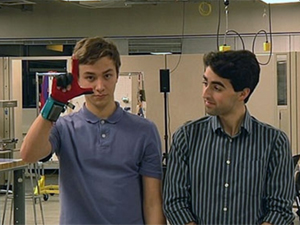



Date:26/04/16
 Two undergraduate students at the University of Washington have created a pair of smart gloves that can translate American Sign Language (ASL) automatically into text or speech. Designed to help bridge the communication gap between the Deaf and hearing communities, the SignAloud gloves use sophisticated sensors to recognize ASL gestures. They were recently awarded a $10,000 Lemelson-MIT Student Prize for their work.
Two undergraduate students at the University of Washington have created a pair of smart gloves that can translate American Sign Language (ASL) automatically into text or speech. Designed to help bridge the communication gap between the Deaf and hearing communities, the SignAloud gloves use sophisticated sensors to recognize ASL gestures. They were recently awarded a $10,000 Lemelson-MIT Student Prize for their work.
The inventors, Navid Azodi and Thomas Pryor, created the SignAloud glove prototype in their spare time at school, using the tech resources provided by the UW CoMotion MakerSpace, which offers communal equipment for students.
Azodi and Pryor say they wanted to create a pair of gloves that not only translated American Sign Language, but was comfortable and lightweight.
“Many of the sign language translation devices already out there are not practical for everyday use,” Pryor explains. “Some use video input, while others have sensors that cover the user’s entire arm or body.”
The SignAloud gloves, meanwhile, are more compact, covering only the hands. Pryor hopes that they could one day be as easy to use—and as commonplace—as hearing aids or contact lenses. (You can watch the technology in action below.)
The SignAloud gloves are equipped with sensors and connected via Bluetooth to a computer, which analyzes and translates gestures: Whenever a gesture matches the computer’s database, the word or phrase is spoken through a speaker. Pryor and Azadi believe the gloves could also be used to enhance user experience in virtual reality and monitor the rehabilitation of stroke patients, though their primary interest is developing them for use by the Deaf community.
“Our purpose for developing these gloves was to provide an easy-to-use bridge between native speakers of American Sign Language and the rest of the world,” Azodi explains. “The idea initially came out of our shared interest in invention and problem solving. But coupling it with our belief that communication is a fundamental human right, we set out to make it more accessible to a larger audience.”
High-tech gloves turn sign language into speech
 Two undergraduate students at the University of Washington have created a pair of smart gloves that can translate American Sign Language (ASL) automatically into text or speech. Designed to help bridge the communication gap between the Deaf and hearing communities, the SignAloud gloves use sophisticated sensors to recognize ASL gestures. They were recently awarded a $10,000 Lemelson-MIT Student Prize for their work.
Two undergraduate students at the University of Washington have created a pair of smart gloves that can translate American Sign Language (ASL) automatically into text or speech. Designed to help bridge the communication gap between the Deaf and hearing communities, the SignAloud gloves use sophisticated sensors to recognize ASL gestures. They were recently awarded a $10,000 Lemelson-MIT Student Prize for their work.The inventors, Navid Azodi and Thomas Pryor, created the SignAloud glove prototype in their spare time at school, using the tech resources provided by the UW CoMotion MakerSpace, which offers communal equipment for students.
Azodi and Pryor say they wanted to create a pair of gloves that not only translated American Sign Language, but was comfortable and lightweight.
“Many of the sign language translation devices already out there are not practical for everyday use,” Pryor explains. “Some use video input, while others have sensors that cover the user’s entire arm or body.”
The SignAloud gloves, meanwhile, are more compact, covering only the hands. Pryor hopes that they could one day be as easy to use—and as commonplace—as hearing aids or contact lenses. (You can watch the technology in action below.)
The SignAloud gloves are equipped with sensors and connected via Bluetooth to a computer, which analyzes and translates gestures: Whenever a gesture matches the computer’s database, the word or phrase is spoken through a speaker. Pryor and Azadi believe the gloves could also be used to enhance user experience in virtual reality and monitor the rehabilitation of stroke patients, though their primary interest is developing them for use by the Deaf community.
“Our purpose for developing these gloves was to provide an easy-to-use bridge between native speakers of American Sign Language and the rest of the world,” Azodi explains. “The idea initially came out of our shared interest in invention and problem solving. But coupling it with our belief that communication is a fundamental human right, we set out to make it more accessible to a larger audience.”
Views: 618
©ictnews.az. All rights reserved.Similar news
- Justin Timberlake takes stake in Facebook rival MySpace
- Wills and Kate to promote UK tech sector at Hollywood debate
- 35% of American Adults Own a Smartphone
- How does Azerbaijan use plastic cards?
- Imperial College London given £5.9m grant to research smart cities
- Search and Email Still the Most Popular Online Activities
- Nokia to ship Windows Phone in time for holiday sales
- Internet 'may be changing brains'
- Would-be iPhone buyers still face weeks-long waits
- Under pressure, China company scraps Steve Jobs doll
- Jobs was told anti-poaching idea "likely illegal"
- Angelic "Steve Jobs" loves Android in Taiwan TV ad
- Kinect for Windows gesture sensor launched by Microsoft
- Kindle-wielding Amazon dips toes into physical world
- Video game sales fall ahead of PlayStation Vita launch





















